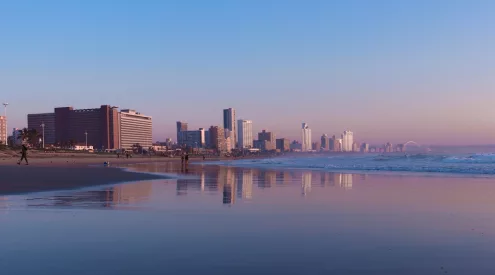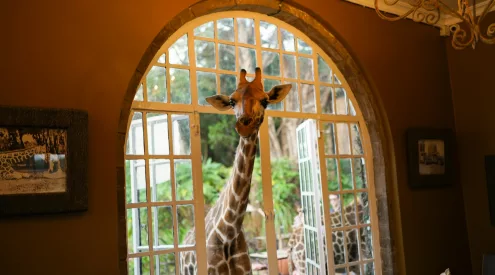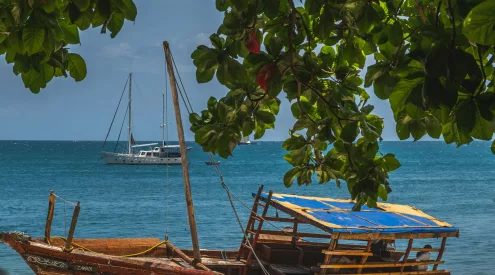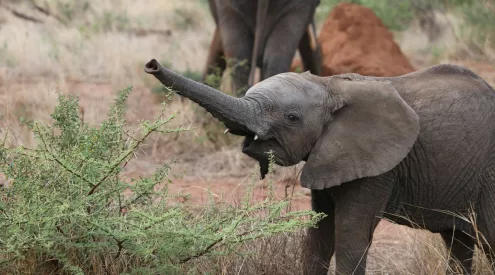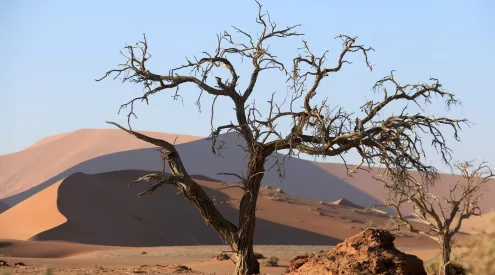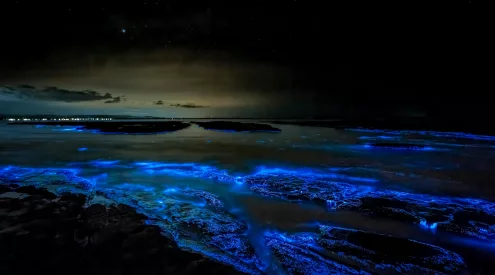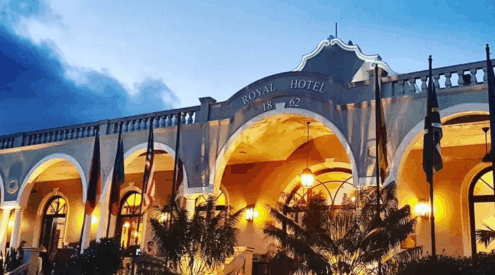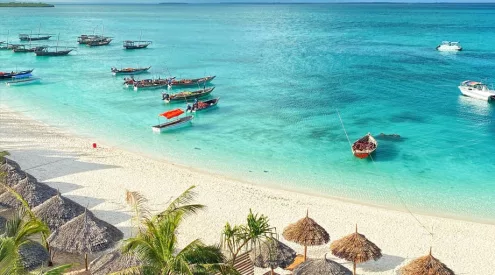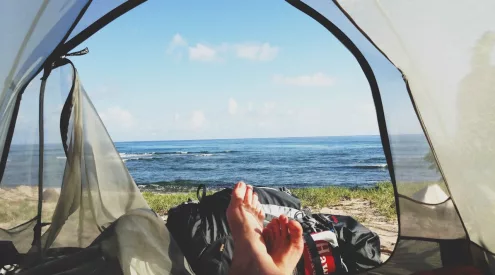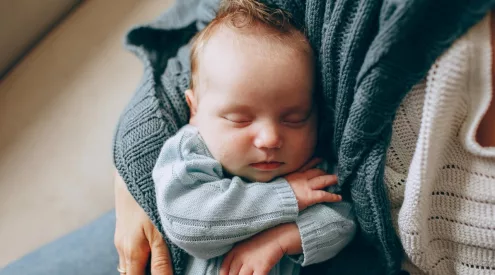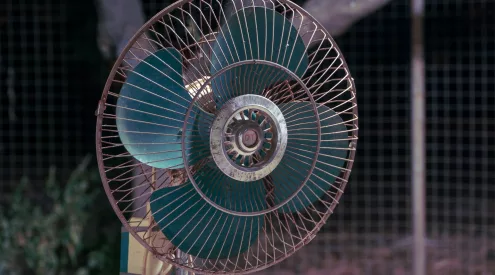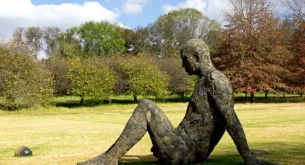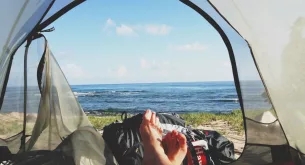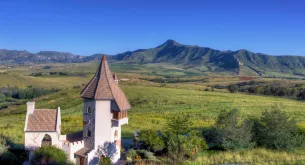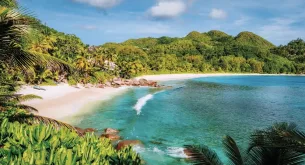‘It could be worse’ is what I usually say to Alan when we’re whizzing over pot-holed roads, squished tightly between people and cargo, on some form of local transport. What follows is a reminiscing of all the times it has been worse; like the time the Malawian matola was so jam packed I had three children on my knee and chickens around my head, or the time we had people throwing up all around us on the rollercoaster bus to Aksum in Ethiopia. Relating these “˜worse transport times’ to each other helps us laugh off the present moment and forget about our aching bums, the deathly driving and the goats nibbling our toes. But last week, Alan and I finally made a trip that could not be laughed away by any means. It was bad. So bad that it put all our other transport stories to shame.
The journey from Moyale to Nairobi through northern Kenya.
The sheer mention of it is enough to evoke fear in any traveller’s heart. Notorious for the state of its roads, the volcanic rocks that make driving a nightmare, the desolation of the landscape, and the feuding between local tribal groups, it’s a journey that has featured frequently in travellers’ tales of suffering. The real protagonists of these tales, however, are the bandits; gangs with threatening AK47’s that hijack cars and buses on the lonely stretch of desert road.
But I was prepared. I’d heard all the stories and I’d taken precautions. I had split my money into two bags and stuffed a wad of it into my bra; I’d locked every pocket of my backpack and locked the backpack in a cage. I was ready. In fact, I was even a little excited; my first encounter with bandits would give me something adventurous to write home about.
We crossed the border from Ethiopia to Kenya in the early hours of the morning and hopped on the bus at Moyale. With our bags securely tied to the roof with the rest of the cargo, we took our seats. I wasn’t quite prepared for the force of the first five minutes of bumps. As we started bounding up into the air, I yelled out with surprise and pain. Was it going to be so bumpy the entire time? Indeed it was! For the first four hours, it was bearable – even exciting, like being on a crazy rollercoaster ride. After every airborne moment, our fellow passengers laughed out loud and turned around to see how the two mzungus had handled it.
It soon lost its novelty, however, and soon enough everyone settled down to suffer their lot in silence. My entire body slowly grew with pain; it swelled with bruises and burst with cramps. Since my legs couldn’t reach the ground, my feet became numb from swinging and the backs of my legs became raw and chafed. But my anticipation of meeting with the bandits kept me alert and full of fight.
Outside, the landscape transformed from the green bush of southern Ethiopia into prime bandit territory: a sandy horizon peppered with black volcanic rocks, inhospitably beautiful in a stark sort of way. Occasionally a mirage of white clouds appeared on the horizon, which transformed into herds of very resilient sheep. But still no bandits.
The absent bandits and our search for them became our own little game. We saw evidence of banditry in everything: the carcasses of dead animals on the roadside, the lonely dwellings far in the distance, the camel tracks in the sand. ‘Here come the bandits!’ we cried when we saw an approaching cattle truck with its passengers holding tightly to its roof. And when we finally got a flat tire and stopped for half an hour, during which time Alan and I fell asleep outstretched on the road, it could only have been the work of a bandits’ gun.
But, despite their residue left all over the landscape, after 12 hours of travelling we still hadn’t encountered any gun-wielding sociopaths. I gave up on my hope of meeting bandits in northern Kenya, and with it went my ability to endure the torments of the journey. The second half of the trip was sheer horror; every part of my squashed body screamed in pain at every bump, while the bruises on my knees and the back of my legs expanded. The window next to me shook so hard and for so long that it shattered all over, cutting my hand in the process. Though I pride myself on being a “˜tough’ traveller, I’ll admit there were times I cried real tears from sheer pain and exhaustion.
By the end of the journey, after 24 hours of bumps and bruises, I felt beaten up and tortured. I’d been hit and kicked, stabbed and shot by the horror of northern Kenyan roads, and I’d been reduced to begging and to tears by its unrelenting cruelty. I realised then, as we were winding our way into Nairobi at last, that I had encountered the bandits after all. They may not have been in the form of people, but the bandits had certainly bitten.
Throughout the trip, my usual travel slogan – ‘it could be worse’ – simply held no relevance. ‘Nothing could ever be worse than that bandit territory,’ I thought as I stepped off the bus into the slums of Nairobi, ‘I have lived through hell and survived.’
Today I travelled from Kampala to Kabale in Uganda by local bus. I had a seat all to myself and even the seat beside me was free. While spreading out amidst this rare luxury I thought back to our Kenyan bus ride and the sheer horror of it burst across my memory. As I was confirming in my mind that it really was the worst possible travel day ever, my Ugandan bus came to a stop. Up ahead was an awful accident. A truck had collided with another petroleum vehicle that had come to pieces on impact and lay unrecognisable and disheveled beside the road. A river of petroleum ran down the street like a sticky black blanket, absorbing the green of the nearby plants and mingling with the blood of the dead passengers who were lined up like rigid sardines beside the road. As we waited for the vehicles to be moved so that we could continue on our way, I thought again of my Moyale-Nairobi trip. ‘It could’ve been worse,’ I thought to myself, ‘it can always be worse.’

